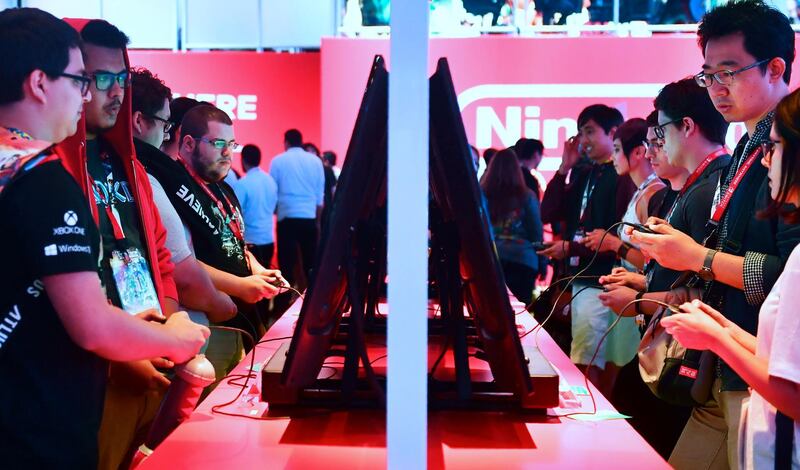Yesterday the World Health Organisation (WHO) released its annual International Classification of Diseases report (ICD). This document identifying health trends and statistics is considered a global authority on conditions affecting health.
This year's report, however, contained one surprise: alongside the expected descriptions of blood, skin and respiratory disorders, it listed compulsive video gaming as a mental health disorder.
It is impossible to do justice to such a complex issue in one column but this issue affects me as a gamer, parent and a neuroscientist involved in policymaking, who has been collaborating with the gaming industry for more than a decade.
Whether video games are addictive has been an ongoing debate. In 2010, when I was the head of the neuroscience and public policy programme at the Centre for Strategic Analysis, several parliamentary members raised concerns about the negative effects of compulsive use of the internet and video games on children's behaviour.
My team organised workshops and published a couple of policy documents to shed light on the issue. The main axes discussed were the part played by parental monitoring, actions to be taken by the industry to prevent compulsive gaming and the need for research to assess the extent of the problem.
The negative effects of the internet and video games were also debated in the US as part of the preparatory work for the Diagnostic and Statistical Manual of Mental Disorders report, the standard reference for psychiatric illnesses, published by the American Psychiatric Association in 2013.
The paper introduced a new category called "behavioural addictions". Internet gaming disorder was included, with recommendation for further study.
_______________
Read more from Opinion:
[ Far from a fantasist, Trump is a realist who accepts the world order is changing ]
[ World Refugee Day: UAE shelter for refugees is a rare humanitarian gesture in today's world ]
[ A wonderful World Cup - shame about the politics ]
_______________
Whether people acknowledge it or not, video games have become a key part of our daily lives, from professional training to entertainment and esports, the gaming equivalent of the Olympic Games, when tens of thousands of fans watch gamers compete in arenas while millions take part online.
When it comes to sales, video games outperform the movie industry by far. The previous version of the ICD dates back to the early 1990s, a time when the video game industry was worth less than $10 billion. The latest estimates report a market worth more than $110 billion. With more than two billion gamers worldwide, no wonder issues have arisen. But there is a clear asymmetry in the coverage of the negative side of gaming compared to its benefits.
Since the information surfaced in October last year that gaming disorders will be included in the ICD report, gaming developers and distributers have disputed some of the WHO's claims, among them that "the behaviour pattern is of sufficient severity to result in significant impairment in personal, family, social, educational, occupational or other important areas of functioning".
Yet we are still lacking precise data to assess the magnitude of the issue. In addition, as raised by psychologists who support the gaming industry, addiction is such a multifactorial phenomenon that it is not possible to claim a direct causal attribution to video games alone.
The diversity of games is also a mitigating factor. Neuroimaging studies have revealed that some activity in the reward system of gamers resemble those found in people addicted to substances but similar results have emerged from craving chocolate or binge-watching TV shows.
People might see the resistance of the gaming industry as a classic case of a business sector defending its activities when regulation rear its head. This might very well be the case. But health professionals in the psychiatric field are also concerned by the lack of data.
Health insurers have also entered the discussion. The ICD’s inclusion of gaming disorders without a clear definition of when the addictive behaviour starts is a concern but perhaps not as much as the impact on healthcare costs since they will have to cover for treatment.
There is no denial that with billions of gamers around the world, the number of cases of behavioural disorders associated with excessive gaming behaviour have proliferated.
It is also important to realise that children are not the only ones concerned. Adults game a lot. It is natural for public authorities to keep an eye on what is going on and help those in need.
The gaming industry has been using insights from behavioural and brain sciences for decades to better engage gamers and I have been one of the many behavioural and brain scientists helping with this.
But the gaming industry is also aware it needs to take care of its consumers. More than 15 years ago, the Pan-European Game Information (PEGI) was introduced by the Interactive Software Federation of Europe, an association of professionals in the gaming industry.
PEGI is a self-regulatory system to inform parents about the suitability of video games. Over the past five years, I have been increasingly asked by game developers to work on better understanding the brains of gamers to help them switch off.
Some might see my views as biased since I am working with the gaming industry and I am a gamer myself but I know the issue well enough to say that it is in everyone’s interest to address the issue of excessive gaming in a co-ordinated and measured way. All stakeholders should keep collaborating with the health and wellbeing of gamers as a key priority.
Professor Olivier Oullier is the president of Emotiv, a neuroscientist and a DJ. He served as global head of strategy in health and healthcare and is a member of the executive committee of the World Economic Forum






